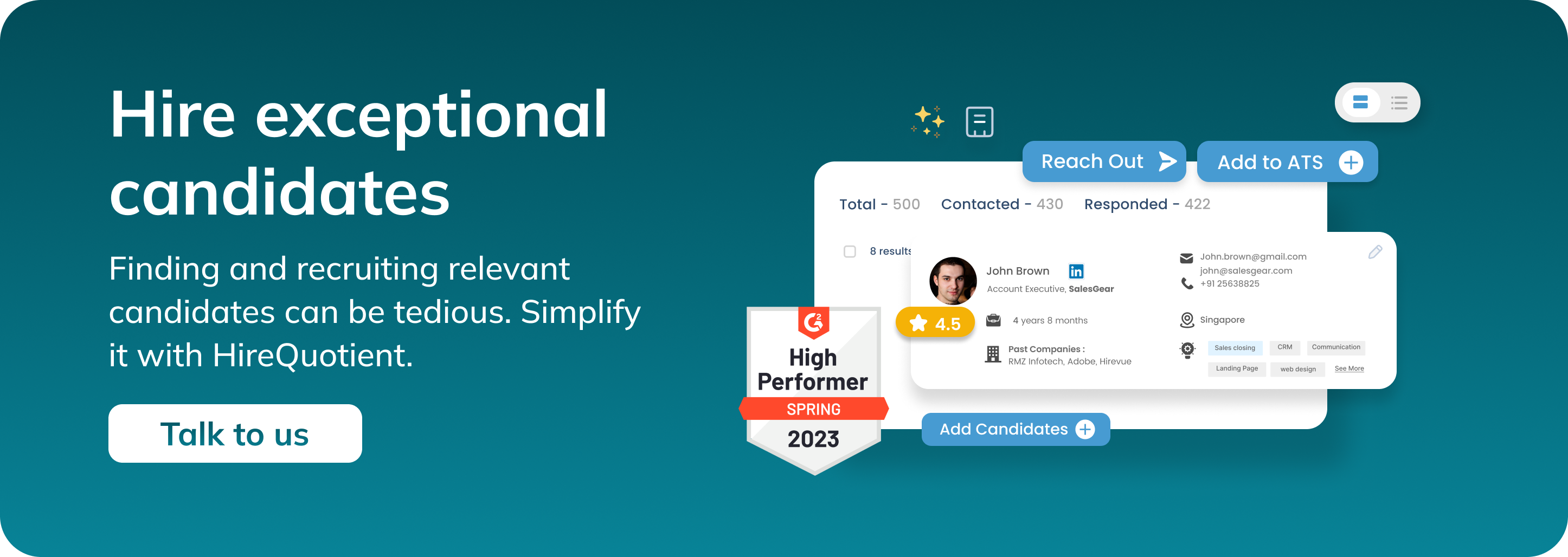Top Interview Techniques to Conduct an Effective Interview
Published on November 1st, 2022
Interviewing candidates is one of the most important aspects of the employment process, especially for a hiring manager. There are a lot of things that can go wrong and cost you either the greatest hire on your candidate list or the wrong hire. Thus, as it affects the firm negatively, implementing the right interview techniques is extremely important.
Thus, there are different ways to prevent interview mistakes. Knowing and implementing effective interview techniques will strengthen your interview skills, resulting in far more successful hires.
So, we’ve compiled a comprehensive guide to our most effective interview techniques so you can hire the candidate with confidence.
Types Of Job Interview Techniques
1. Common Interview Techniques
As an employer, you have several interview formats to choose from - one-on-one, group, phone screenings, etc. Selecting the right format is crucial to effectively evaluate candidates. One-on-one interviews allow you to directly gauge a candidate's skills and fit, while group interviews enable comparisons between multiple candidates simultaneously.
2. Phone Interview Techniques
Phone interviews are typically the first step after your initial application. A recruiter or hiring manager can briefly discuss the role and evaluate the untapped potential candidates before progressing to further rounds. It allows to efficiently screen many candidates. You can most likely have 2-3 phone interviews for a single role. Thus, prepare by reviewing 6 to 7 common interview questions, having the candidate's resume handy, and being in a quiet environment.
3. Video Interview Techniques
Video interviewing software enables employers to conveniently evaluate candidates remotely. You'll be asked to log in to a video platform and discuss the role face-to-face, just like an in-person interview. Maintain professional dress, good eye contact with the camera, and ensure proper lighting and lack of distractions. Some companies use pre-recorded videos where you record responses to set questions, allowing reviewers to evaluate anytime.
4. In-person interview techniques
No software can fully replace the value of meeting candidates in person at your office. In these interviews, you can thoroughly evaluate technical skills, cultural fit, passion for the role, and overall impression in a way that's difficult remotely. Pay attention to the questions they ask, how they present themselves physically and interact with your team.
5. Group Interview Techniques
Group interviews enable you to monitor how candidates perform under pressure and handle competition/teamwork scenarios. Assign group activities or case studies and observe how they problem-solve, and collaborate, and if any natural leaders emerge. This provides a realistic snapshot into how they may perform day-to-day.
6. Panel Interview Techniques
A panel interview with multiple interviewers facilitates a 360-degree evaluation of the candidate. Have representatives from different teams/levels to gauge the candidate's ability to adapt communication styles to diverse personalities. This setting also helps reveal how they operate when outnumbered and put on the spot.
Interview Techniques For Recruiters
When interviewing candidates for an open role, time is limited but you need to gather comprehensive insights to make the right hiring decision. Effective interview techniques can help you efficiently evaluate candidates and ensure you hire the best fit for the company. An ideal interview should be a two-way street - allowing you to assess the candidate while also giving them a chance to learn about your organization.
Mastering the art of conducting interviews is crucial for bringing top talent into your business. Here are some powerful techniques to help you carry out successful interviews:
1. Prepare for the interview
Examine the position you are recruiting for and the applicant's resume and/or cover letter as you prepare for the upcoming interview. Think about the needs the position would fulfill for the business, and then contrast those needs with the expected level of education, ability, and experience of your ideal candidate. Make a list of all of these prerequisites before using it to formulate thoughtful interview questions.
Create a list of some good interview questions by including common, situational, and behavioral ones.
2. Understand the STAR interview process
The STAR method is a common technique used when interviewing promising candidates. The STAR acronym stands for:
- Situation: Describe the situation or challenge faced
- Task: Describe the individual task or requirement
- Action: Describe the action taken to overcome the situation or challenge
- Result: Describe the result or the outcome of the action taken
When you ask job prospects behavioral interview questions, they frequently employ this technique. Candidates are prompted to describe an instance in which they applied particular skills in the job or overcame a particular problem. To ensure that candidates are adequately addressing your question, pay attention to the STAR approach in their responses.
If the interviewee doesn't respond to your questions using the STAR approach, you can utilize the STAR method to come up with follow-up questions or to ask for more details to gain a deeper understanding of the candidate's prior work experience. You may, for instance, ask applicants to be more detailed or to explain the outcomes of their activity.
3. Describe the company and the position to the interviewee
Kick off the interview by introducing yourself and discussing the position with the interviewee. Give a brief background and overview of the company and how the position they’re interviewing for fits into the organization’s objectives and goals. This allows job candidates to better understand the expectations and responsibilities of the position.
4. Explain the interview process
Now that you have a basic camaraderie with the candidate, explain how the rest of the interview will transpire. Give the candidate a clear picture of the company’s hiring process and the upcoming steps to look forward to. A clear explanation is essential especially if you have a long hiring process and multiple rounds.
Details like when would the candidate be contacted, will they receive an email or a phone call, and how long it usually takes for the remainder of the process are some of the things you must clarify.
5. Learn about the candidate’s career goals
It can be helpful to comprehend the interviewee's career objectives before moving on to role-specific interview questions. Ask open-ended questions about their professional aspirations and motivations for applying for the role.
This gives you the chance to learn about their objectives for professional growth and enables you to gauge how well they understand the business and the position in question.
6. Ask interview questions related to the position
Probably one of the best interview techniques experienced recruiters follow, listing two sets of questions before every interview is important. One set of questions must be about the job opening itself and the other, particularly pertinent to the candidate.
Begin by jotting down the key responsibilities of the available position and compiling knowledgeable questions related to these responsibilities. During this process, it is important to reach out to the hiring manager who is recruiting for this particular position and extract crucial information for the questionnaire.
Secondly, gather information about the applicant and make a list of questions.
7. Gather more information with follow-up questions
Ask follow-up questions to learn more about the experience of a candidate. You can gain more understanding of a candidate's cognitive processes, personality, values, and experience by asking them to elaborate on their responses.
Use your list of prepared interview questions as a guide rather than a strict plan and be prepared to ask a follow-up question at any time.
8. Take Notes
To help you make more confident and informed hiring decisions, take notes during the interview so you can remember more details later on. For example, you can jot down your first impressions of the candidates, take note of their body language, and write down a few tidbits of information you learn from a candidate’s answers.
9. Give candidates the chance to ask questions
Give the candidate enough time to ask questions about the role, team, and business. This not only gives them the chance to decide whether the job is a suitable fit for them, but it also enables you to gauge their level of interest and comprehension of the business.
Interview Techniques For Candidates
A few tips for the candidates to outperform and remain confident in the interview include,
- Be on time. This often means 10-15 minutes early. Interviewers often are ready before the appointment.
- Know the interviewer’s name, spelling, and pronunciation.
- Have some questions of your own prepared in advance.
- Bring several copies of your resume.
- Have a reliable pen and a small notepad with you.
- Greet the interviewer with a handshake and a smile.
- Don’t be embarrassed if you are nervous.
- Listen carefully to the interviewer.
- Be prepared for personalized interview questions.
- Wait for the interviewer to mention salary and benefits.
- Close on a positive, enthusiastic note.
- No interview is complete until you follow up with a thank-you note.
Final Thoughts
If you're new to conducting job interviews, draw from your own experiences as a candidate. Reflect on the interviews you've gone through - what made you feel at ease and what moments made you uncomfortable or left a poor impression. Putting yourself in the applicant's shoes can help you develop empathy and understand how your words and actions impact the candidate's experience. However, finding and engaging those ideal candidates in the first place can be a challenge.
This is where EasySource, the most advanced candidate sourcing software, can be a game-changer for your recruitment process.
How does EasySource help in conducting effective interviews?
By leveraging AI and intelligent automation, EasySource allows you to effortlessly source, screen, and engage qualified active and passive candidates at scale.
- EasySource is built to meet even the toughest recruitment challenges, from entry-level to executive positions. Its candidate discovery module uses simple prompts or your job descriptions to source relevant candidates from active and hidden talent pools. Combined with multiple high-intent signals, you'll connect with candidates genuinely interested in your organization.
- Inundated with large applicant volumes? EasySource's persona-based screening module finds qualified candidates in minutes by evaluating nuances beyond just the job description. Your recruiters can then focus efforts on engaging only the most promising fits.
- Manually drafting personalized outreach to hundreds of candidates is incredibly time-consuming. EasySource crafts highly customized messages that speak directly to why a candidate is suited for the role by analyzing their profiles against your requirements.
- With easy integration, EasySource can also tap into your existing talent pool, screening internal candidates and re-engaging them across channels to rejoin your recruitment pipeline when appropriate roles open up.
- By combining EasySource's intelligent sourcing capabilities with a thoughtful, human-centric interview process, you'll be primed to consistently attract, evaluate, and hire the top talent that elevates your business to new heights. Empower your team to make those great hires that drive your company forward.
The interview is your chance to market your employer brand while thoroughly vetting candidates. Approaching it with preparation, professionalism, and considering the human element will set you up to consistently make great hires that propel your business forward.
Authors

Soujanya Varada
As a technical content writer and social media strategist, Soujanya develops and manages strategies at HireQuotient. With strong technical background and years of experience in content management, she looks for opportunities to flourish in the digital space. Soujanya is also a dance fanatic and believes in spreading light!
Hire the best without stress
Ask us how
Never Miss The Updates
We cover all recruitment, talent analytics, L&D, DEI, pre-employment, candidate screening, and hiring tools. Join our force & subscribe now!
Stay On Top Of Everything In HR



